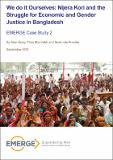| dc.contributor.author | Greig, Alan | |
| dc.contributor.author | Shahrokh, Thea | |
| dc.contributor.author | Preetha, Sushmita | |
| dc.coverage.spatial | Bangladesh | en |
| dc.date.accessioned | 2015-09-16T11:46:48Z | |
| dc.date.available | 2015-09-16T11:46:48Z | |
| dc.date.issued | 2015-09-16 | |
| dc.identifier.citation | Greig, A. Shahrokh, T., Preetha, S. (2015) ‘We do it Ourselves: Nijera Kori and the Struggle for Economic and Gender Justice in Bangladesh, EMERGE Case Study, Promundo-US, Sonke Gender Justice and the Institute of Development Studies | en |
| dc.identifier.isbn | 978 1 78118 265 9 | |
| dc.identifier.uri | https://opendocs.ids.ac.uk/opendocs/handle/20.500.12413/7056 | |
| dc.description.abstract | Deep-rooted patriarchal systems uphold gender and class-based inequalities in Bangladesh, within which the issue of land distribution and use remains integral to the transformation of poverty for a large number of women and men. Nijera Kori is a national social movement organising landless people to claim their rights and challenge the discrimination that constrains their agency and development. Through qualitative research, backed up by an extensive secondary literature, this study explores how and why men and women are working together for the gender equality objectives of this movement, and how these relate to wider economic justice goals. Across two sites in Northern Bangladesh the qualitative research engaged men and women from landless groups, Nijera Kori staff, and stakeholder groups.
The data indicates that by working to raise the consciousness of, and bridge relationships between men and women, Nijera Kori’s approach reflects differential entry points for analysing gendered power and the importance of synchronising work between men and women for gender equality. Furthermore, a commitment to democratic practice in the movement helps realise shared commitments to gender equity. This approach has enabled men and women to address women’s rights issues, tackle corruption in public service provision and claim land rights. Domains for change reach family and community, breaking down barriers to women’s participation in public life. At the household level the redistribution of caring roles among men and women has emerged and the community collective agreements on dowry and early marriage suggests a degree of normative change. This report makes recommendations that men and women’s shared claims for interpersonal and political accountability through collective action are critical in enabling gender equitable pathways for economic justice. | en |
| dc.language.iso | en | en |
| dc.publisher | Promundo-US, Sonke Gender Justice and the Institute of Development Studies | en |
| dc.relation.ispartofseries | EMERGE Case Study; | |
| dc.rights | You are free to:
Share — copy and redistribute the material in any medium or format.
Adapt — remix, transform, and build upon the material.
For any purpose, even commercially. The licensor cannot revoke these freedoms as long as you follow these license terms.
License terms: You must give appropriate credit, provide a link to the license, and indicate if changes were made. You may do so in any reasonable manner, but not in any way that suggests the licensor endorses you or your use. | en |
| dc.rights.uri | http://www.ids.ac.uk/files/dmfile/IDSOpenDocsStandardTermsOfUse.pdf | en |
| dc.subject | Gender | en |
| dc.title | We do it Ourselves: Nijera Kori and the Struggle for Economic and Gender Justice in Bangladesh | en |
| dc.type | Series paper (non-IDS) | en |
| dc.rights.holder | Institute of Development Studies, Promundo-US and Sonke Gender Justice | en |
| dc.identifier.team | Gender and Sexuality | en |

